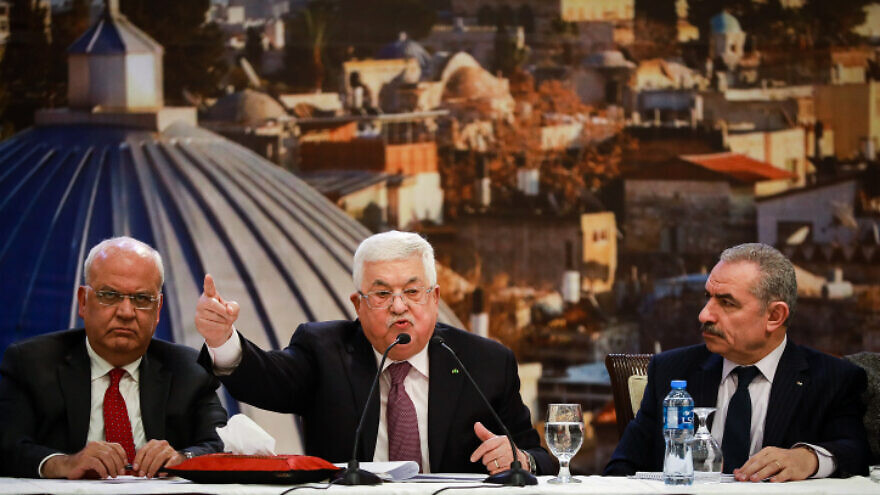Australia/Israel Review
Scribblings: To spite your face…?
Oct 1, 2020 | Tzvi Fleischer

The Palestinian Authority (PA) was very angry and upset about Israeli Government plans to extend Israeli sovereignty to parts of the West Bank in accordance with the map provided in the Trump Administration’s peace plan. Opposition to the plans for “annexation”, as the PA labelled it, led the PA to cut off almost all cooperation with Israel. This involved not only things like creating a financial crisis in the PA’s budget by rejecting tax transfers from Israel, and making it very hard for sick Palestinians who need medical treatment in Israeli hospitals to get it, but even curtailing security cooperation with Israeli security forces. Security cooperation has been essential in helping the PA control efforts by Hamas and other radical groups to overthrow PA rule in the West Bank.
In other words, these measures clearly hurt Palestinians and the PA much more than they hurt Israel. But perhaps they can be understood as a way to express anger over what the Palestinians argue was an Israeli plan to steal “their” land.
But here’s the weird thing – in the wake of the Israel-UAE deal, so-called annexation is now “off the table”, at least for the next few years. And yet the PA appears to have cancelled none of its “anti-annexation” measures, with both the PA and ordinary Palestinians suffering as a result, apparently pointlessly.
It is true that Israeli PM Binyamin Netanyahu said that the plans to extend sovereignty were only “suspended”, and not cancelled. This was to salve the blow to key domestic constituencies which very much wanted the sovereignty extension to go ahead, but the US Administration has made it very clear it will not approve such a move anytime soon, and without US approval, it will not happen.
Yet as the New York Times reported on Sept. 11, PA President Mahmoud Abbas is still refusing to accept taxes collected by Israel on behalf of the PA, which “account for more than 60 percent of the authority’s budget.” As a result, “salaries in the territory are not being paid, families are enduring hardships, and the Palestinian Authority is careering toward bankruptcy,” the paper reported.
Moreover, the NY Times story reported that:
“When the British foreign secretary, Dominic Raab, encouraged Mr. Abbas to take the money in a meeting in Ramallah [in early September], Mr. Abbas responded, ‘In return for what?’ according to a person familiar with details of the exchange.”
To be clear, the PA is rejecting the receipt of more than US$100 million per month of Palestinian money. This money is taxes paid by Palestinians on imported goods, collected by Israel on the Palestinians’ behalf under long-standing agreements.
Diplomats who met with Abbas say he does not want to go back to the previous arrangements with Israel until he gets “some new concessions from Israel with which to assure the Palestinian public that his rejection of the money, and their summer-long hardship, were not all in vain,” according to the story.
Other aspects of Israeli-Palestinian cooperation which benefit Palestinians also remain suspended, such as the arrangements for permits to get Palestinians needed medical treatment.
What makes this doubly irresponsible is that the West Bank, like Israel, is in the midst of a coronavirus second wave, averaging more than 500 new cases per day by mid-September, so Palestinians urgently need fully functioning government services.
As Danielle Pletka notes in this edition, the Palestinian leadership has a long history of making poor choices. But the apparently pointless refusal to accept money the PA is entitled to and desperately needs seems to go beyond that. It is not just a poor choice but an almost incomprehensible one.
More on the Islamist PA response to normalisation
Last month in this space, I documented how the supposedly secular Palestinian Authority had been using Islamist arguments to oppose the United Arab Emirates (UAE) plans to normalise relations with Israel – basically arguing that doing so was a violation of Islam, a religious sin.
This has continued. More than this, the PA has also been invoking Islamic religious sources to send antisemitic messages about Jews, not ‘just’ Israelis or Zionists.
On Sept. 17, the PA Ministry of Religious Affairs issued guidelines for the sermons to be delivered in West Bank mosques on that Friday, Sept. 18. The messages the PA demanded all imams preach to their congregations included (translation by Palestinian Media Watch):
• “There is nothing that harms Palestine and its holy sites more than making an alliance with the Jews, being connected to them, and relying on them.”
• “Normalisation with the Zionist entity is high treason against Palestine, Jerusalem, the blood of the Martyrs, and the suffering of the prisoners,”
• Calling on “the Arab and Islamic peoples and the free people of the world to stand with Palestine in order to bring down the agreement of humiliation and treason by the UAE and Bahrain [emphasis in original].”
Imams were also to warn against “Obedience to the Jews and being dragged after them.”
Cited as a source for the sermon was a potentially problematic verse from the Quran which has generally been interpreted as a warning to Muslims against trusting Jews and Christians: “And never will the Jews or the Christians approve of you until you follow their religion [Sura 2:120].”
Needless to say, this message against allying with or trusting “Jews” is not very encouraging for any future Israeli-Palestinian coexistence, especially when framed in religious terms.
Tags: Israel, Palestinian Authority, Palestinians






